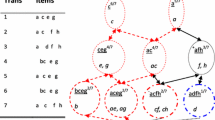Abstract
Recent studies on frequent itemset mining algorithms resulted in significant performance improvements. However, if the minimal support threshold is set too low, or the data is highly correlated, the number of frequent itemsets itself can be prohibitively large. To overcome this problem, recently several proposals have been made to construct a concise representation of the frequent itemsets, instead of mining all frequent itemsets. The main goal of this paper is to identify redundancies in the set of all frequent itemsets and to exploit these redundancies in order to reduce the result of a mining operation. We present deduction rules to derive tight bounds on the support of candidate itemsets. We show how the deduction rules allow for constructing a minimal representation for all frequent itemsets. We also present connections between our proposal and recent proposals for concise representations and we give the results of experiments on real-life datasets that show the effectiveness of the deduction rules. In fact, the experiments even show that in many cases, first mining the concise representation, and then creating the frequent itemsets from this representation outperforms existing frequent set mining algorithms.
Research Assistant of the Fund for Scientific Research — Flanders (FWO-Vlaanderen)
Chapter PDF
Similar content being viewed by others
References
R. Agrawal, T. Imilienski, and A. Swami. Mining association rules between sets of items in large databases. In Proc. ACM SIGMOD Int. Conf. Management of Data, pages 207–216, Washington, D. C., 1993.
R. Agrawal and R. Srikant. Fast algorithms for mining association rules. In Proc. VLDB Int. Conf. Very Large Data Bases, pages 487–499, Santiago, Chile, 1994.
Y. Bastide, R. Taouil, N. Pasquier, G. Stumme, and L. Lakhal. Mining frequent patterns with counting inference. ACM SIGKDD Explorations, 2(2):66–74, 2000.
R. J. Bayardo. Efficiently mining long patterns from databases. In Proc. ACM SIGMOD Int. Conf. Management of Data, pages 85–93, Seattle, Washington, 1998.
J.-F. Boulicaut and A. Bykowski. Frequent closures as a concise representation for binary data mining. In Proc. P a KDD Pacific-Asia Conf. on Knowledge Discovery and Data Mining, pages 62–73, 2000.
J.-F. Boulicaut, A. Bykowski, and C. Rigotti. Approximation of frequency queries by means of free-sets. In Proc. PKDD Int. Conf. Principles of Data Mining and Knowledge Discovery, pages 75–85, 2000.
A. Bykowski and C. Rigotti. A condensed representation to find frequent patterns. In Proc. PODS Int. Conf. Principles of Database Systems, 2001.
T. Calders. Deducing bounds on the frequency of itemsets. In EDBT Workshop DTDM Database Techniques in Data Mining, 2002.
S. Hettich and S. D. Bay. The UCI KDD Archive. [http://kdd.ics.uci.edu]. Irvine, CA: University of California, Department of Information and Computer Science, 1999.
D. E. Knuth. Fundamental Algorithms. Addison-Wesley, Reading, Massachusetts, 1997.
M. Kryszkiewicz. Concise representation of frequent patterns based on disjunctionfree generators. In Proc. IEEE Int. Conf. on Data Mining, pages 305–312, 2001.
H. Mannila and H. Toivonen. Multiple uses of frequent sets and condensed representations. In Proc. KDD Int. Conf. Knowledge Discovery in Databases, 1996.
N. Pasquier, Y. Bastide, R. Taouil, and L. Lakhal. Discovering frequent closed itemsets for association rules. In Proc. ICDT Int. Conf. Database Theory, pages 398–416, 1999.
J. Pei, J. Han, and R. Mao. Closet: An efficient algorithm for mining frequent closed itemsets. In W. Chen, J. F. Naughton, and P. A. Bernstein, editors, ACM SIGMOD Workshop on Research Issues in Data Mining and Knowledge Discovery, Dallas, TX, 2000.
M. J. Zaki and C. Hsiao. ChARM: An efficient algorithm for closed association rule mining. In Technical Report 99-10, Computer Science, Rensselaer Polytechnic Institute, 1999.
Z. Zheng, R. Kohavi, and L. Mason. Real world performance of association rule algorithms. In Proc. KDD Int. Conf. Knowledge Discovery in Databases, pages 401–406. ACM Press, 2001.
Author information
Authors and Affiliations
Editor information
Editors and Affiliations
Rights and permissions
Copyright information
© 2002 Springer-Verlag Berlin Heidelberg
About this paper
Cite this paper
Calders, T., Goethals, B. (2002). Mining All Non-derivable Frequent Itemsets. In: Elomaa, T., Mannila, H., Toivonen, H. (eds) Principles of Data Mining and Knowledge Discovery. PKDD 2002. Lecture Notes in Computer Science, vol 2431. Springer, Berlin, Heidelberg. https://doi.org/10.1007/3-540-45681-3_7
Download citation
DOI: https://doi.org/10.1007/3-540-45681-3_7
Published:
Publisher Name: Springer, Berlin, Heidelberg
Print ISBN: 978-3-540-44037-6
Online ISBN: 978-3-540-45681-0
eBook Packages: Springer Book Archive




